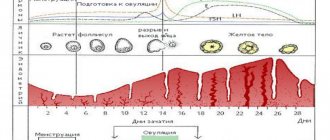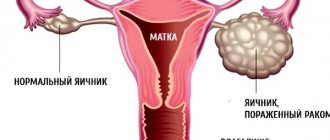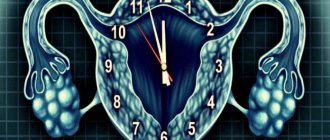The physiological processes occurring in a woman’s body during menopause affect the formation of the hormones FSH and LH: their norm during menopause differs from that observed at a younger age. Often, patients of a gynecologist who have reached menopausal age complain of deterioration in health, which is associated with changes in the level of follicle-stimulating (FSH) and luteinizing (LH) biologically active substances.
Causes of low FSH in women
A decrease in the concentration of follicle-stimulating hormone in a woman’s blood is promoted by:
- Lactation period and pregnancy. The conditions are accompanied by increased production of prolactin. This hormone is necessary for full breastfeeding, but it significantly reduces the concentration of FSH.
- Inflammatory, tumor diseases of the ovaries (polycystic disease, oophoritis, malignant neoplasms).
- Exhaustive dieting, poor quality nutrition, anorexia.
- Disorders of the pituitary gland (dwarfism, pituitary insufficiency).
- Tumor processes of the adrenal cortex (the phenomenon causes persistent hormonal imbalance).
- Sheehan syndrome (characterized by partial destruction of pituitary cells, develops in the period after childbirth).
- Kallmann syndrome (a genetic disease that results in absent or partial puberty).
- Hemochromatosis (characterized by serious metabolic disorders in which iron is deposited inside tissues and organs). The disease can be inherited.
Important: If FSH is low, you should start looking for the cause by reviewing the medications you are taking. Adrenal hormones (Prednisolone, Cortisol), oral contraceptives, anticonvulsants reduce the volume of follicle-stimulating hormone.
Anabolic steroids also reduce FSH levels, so hormonal imbalance in women is associated with professional sports.
Other reasons are previous surgical interventions on the pituitary gland and organs of the reproductive system. Hypothermia, irregular sex life, or, conversely, frequent changes of partners are unfavorable conditions for the state of hormonal balance. Suffered traumatic brain injuries, damage to the abdominal and pelvic organs exclude the possibility of their full functioning.
What FSH level should be considered elevated?
At different ages, FSH norms in women differ significantly. In addition, the concentration of this hormone depends significantly on the phase of the cycle. Therefore, the same level of follicle-stimulating hormone in two different patients can be assessed as normal or elevated.
The concentration of FSH in the blood changes with age:
- in girls of the first year of life it may be higher than in adults;
- before the onset of puberty is on average lower than in women of reproductive age;
- in menopause it increases sharply due to the decline of ovarian function.
FSH levels vary depending on the phase of the menstrual cycle. From its first days, the amount of the hormone increases. This is required to stimulate the maturation of the follicle containing a mature egg. FSH levels reach their peak towards the middle of the cycle. Then it gradually decreases. At the end of the luteal phase, the concentration of the hormone reaches minimum values.
In reproductive medicine, follitropin concentration is measured only at the beginning of the cycle, usually on days 2-3. The results are always interpreted in conjunction with other indicators of the functioning of the endocrine system.
What does FSH level depend on?
FSH is produced in the pituitary gland. Its concentration in the blood directly depends on the amount of estrogen. This is due to the fact that hormone secretion is regulated by a feedback principle. Estrogens are produced primarily in the ovaries. An increase in their number is a signal for the pituitary gland to reduce the production of FSH. If there is less estrogen, the secretion of gonadotropins increases. Some other hormones also affect follitropin levels: directly or indirectly (through a decrease in estrogen concentrations).
Now that you know how the formation of follicle-stimulating hormone is regulated, it will be easy to understand what may be causing an increase in its level. There are two main mechanisms that lead to this:
- changes in the blood level of those hormones that regulate the secretion of FSH;
- dysfunction of the pituitary gland, which produces too much of the hormone (a rare cause, usually caused by a pituitary adenoma - a benign hormone-producing tumor).
In most cases, the reason for the increase in the amount of FSH is precisely the decrease in estrogen production. In turn, estrogen decreases due to:
- age-related decline of ovarian function;
- their damage by pathological processes (cysts, endometriosis, infections);
- surgical damage or removal of the ovaries;
- birth defects in which the ovaries are absent or do not function (Klinefelter or Shereshevsky-Turner syndromes).
In addition, taking certain medications lowers estrogen levels and, accordingly, increases the concentration of gonadotropins. These medications are used for various purposes.
The main ones:
- achieving artificial menopause during the treatment of endometriosis, endometrial hyperplastic processes;
- induction of ovulation (estrogens blockers are prescribed to increase the level of FSH in the blood and normalize ovulatory processes);
- slowing the growth of malignant hormone-dependent tumors of the reproductive system (breast or endometrial cancer).
Usually, if medical intervention has been performed, the reasons for the increase in FSH are obvious: these are previous ovarian surgeries or the use of drugs. In the latter case, laboratory changes are reversible. After stopping the medication, FSH decreases again to normal values.
If the reasons for the increase in FSH are not established, then in the vast majority of cases these changes are due to age-related ovarian decline. Other conditions that lead to this are much less common.
Symptoms of low FSH in women
The following clinical manifestations indicate FSH deficiency in the female body:
- There are disturbances in the menstrual cycle, and often there is a complete cessation of menstruation (the condition is not associated with the onset of menopause).
- Endometriosis, manifested by pain in the suprapubic region and lumbosacral back. Other symptoms of the condition are discomfort during intimacy, increased body temperature, infertility, and uterine bleeding.
- Spontaneous termination of pregnancy (miscarriage).
- Decreased sexual desire or complete absence thereof.
- Delayed or premature onset of puberty.
The listed symptoms manifest a wide range of known diseases. Therefore, in order to make an accurate diagnosis, the patient is sent to undergo a full examination.
Diagnostics
The study includes the implementation of laboratory and hardware methods.
Initially, it is important to establish the concentration of follicle-stimulating hormone. Without conducting laboratory diagnostics, it is impossible to determine that FG is below the norm or corresponds to it. The patient will have to donate blood from a vein (5 ml is enough).
Advice: To get an accurate test result, you need to stop taking hormonal medications 3 days before visiting the test.
It is contraindicated to drink alcohol the night before. Blood is donated on an empty stomach - it is not recommended to eat food, smoke, drink water, coffee, or take medications.
The results of the study are interpreted by a gynecologist. To understand what a low FSH level means in a particular patient, she is referred for additional types of diagnostics.
- Ultrasound. An informative and accessible survey option. The method allows us to identify inflammatory, tumor, and degenerative processes occurring inside the ovaries.
- MRI and CT scans are aimed at identifying pituitary gland disorders, since it is impossible to identify problems of this nature during an external examination of the patient.
- Biochemical and clinical blood test, urine test. Leukocytosis, increased ESR, decreased hemoglobin levels are detected.
Based on the answers from the listed studies, the doctor decides how to increase FSH in a particular patient. Therefore, without knowing the diagnostic results, you cannot administer medications or take any therapeutic measures.
Why does the hormone level decrease?
The reasons leading to a decrease in FSH in women may be:
- Diseases and injuries of the central nervous system leading to insufficiency of the hypothalamus and pituitary gland.
- Tumors of the ovaries and adrenal glands with increased hormonal activity (polycystic disease, adenomas, cancer).
- Sheehan syndrome is an acute circulatory disorder of the pituitary gland during difficult childbirth.
- Congenital pituitary insufficiency.
- Eating disorders: anorexia, “starvation” diets and, conversely, overeating and obesity.
Important! Women who go on a starvation diet to lose weight put themselves at great risk of developing pituitary insufficiency, just like gluttons. It is important to adhere to the “golden mean” in nutrition.
Treatment
Attention: If a reduced FSH concentration is confirmed, treatment involves the use of hormonal agents.
The gynecologist prescribes Biotin, Bromocriptine, Tamifen, Metforfin. The purpose of the prescription is to restore the menstrual cycle and reduce the volume of prolactin. The peculiarity of the drugs is that they do not affect other hormones produced by the pituitary gland.
The listed drugs help reduce prolactin concentrations 2 hours after taking them. Possible side effects are dry mucous membranes, digestive problems, blurred vision, dizziness, weakness. These drugs cause a decrease in blood pressure; regular monitoring of these indicators is required.
Tamifen promotes the appearance of vaginal discharge, causes genital itching, and endometrial hyperplasia.
If a relationship is established between FSH deficiency and adrenal cortex dysfunction, the administration of Hydrocortisone is prescribed. Side effects - weight gain, increased sweating, hypertensive crisis, fatigue.
Reviews from gynecologists indicate the need to take into account that hydrocortisone increases the breakdown of proteins and causes sodium retention within tissues. The condition is characterized by the formation of noticeable peripheral edema.
When pituitary tumors are detected, the method of choice is surgical removal of the tumor.
Ovarian dysfunction is corrected by the simultaneous use of estrogen of synthetic origin and progesterone. This prescription is classified as hormone replacement therapy. A similar regimen is prescribed for women who are having a difficult time with menopause.
Tactics during and after treatment
There is a clear algorithm for what to do to restore and subsequently maintain reproductive health.
Advice: It is important to prevent hypothermia, control weight, be in the fresh air every day, and monitor body hygiene. Do not overwork, leave time for rest in your daily routine.
Monitor the quality of your diet - avoid eating foods with dyes, stabilizers, and artificial fat substitutes. Such a diet is harmful to hormonal levels and health in general. The listed recommendations should be followed not only during treatment, but also after it. This reduces the likelihood of recurrent FSH imbalance in the female body.
Complexes with this research
Female hormones.
Menopause Assessment of the hormonal status of a woman in menopause RUR 2,070 Composition Male infertility. Extended examination Analysis of the state of male reproductive health 26,770 RUR Composition
Male hormones Assessment of hormonal levels in a man at any age RUB 5,710 Composition
IN OTHER COMPLEXES
- Anti-aging diagnostics. Hormonal balance RUB 5,760
- Fitness control of sports nutrition 4,770 RUR
- Anti-aging diagnostics in postmenopause RUB 11,820
- Check-up No. 1 for children and teenagers 10,270 RUR
- Advanced male anti-aging diagnostics RUR 31,780










